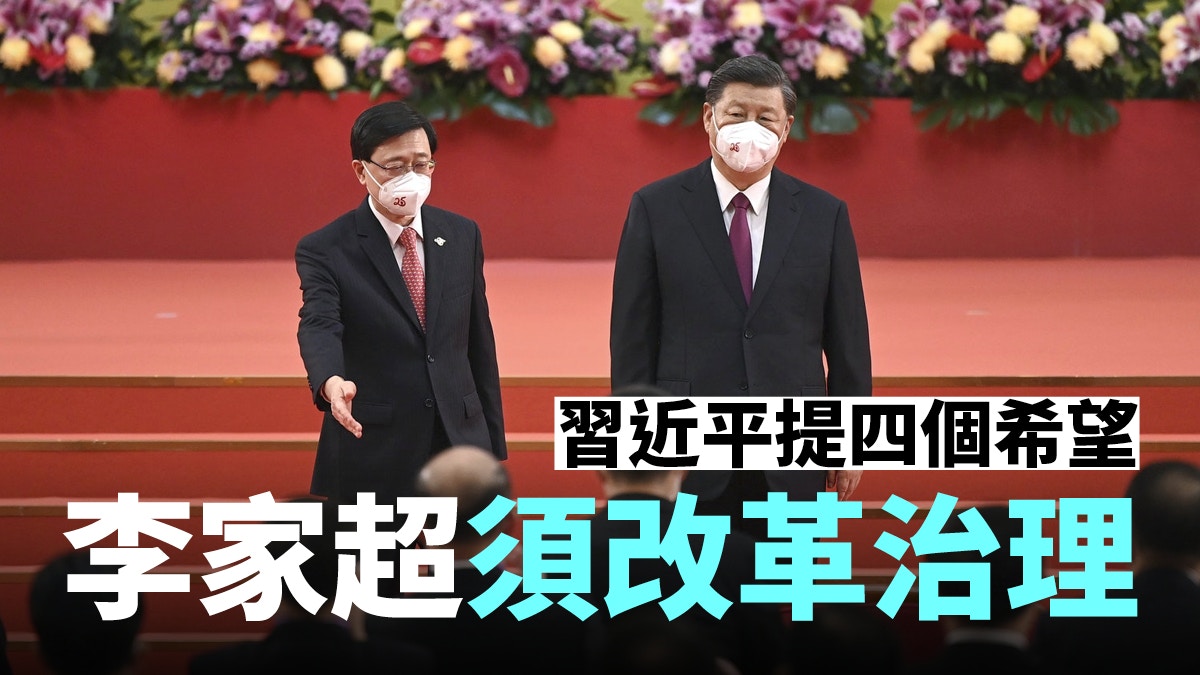Five years ago, President Xi Jinping came to Hong Kong on a special plane for a three-day inspection itinerary.
This year, it is believed that due to the new crown epidemic, the itinerary was changed to two-day same-day trips, and the number of key officials who traveled south by high-speed rail was also reduced.
This is the first time Xi Jinping has left the mainland in more than two years, and the number of confirmed cases in Hong Kong is still at a high level of around 2,000. In fact, it fully reflects the importance he attaches to Hong Kong. As he said after arriving in Hong Kong, in the past "I have been paying attention to and caring about Hong Kong for five years."
"Focus" and "concern" sometimes mean worrying.
In the past five years, Hong Kong has experienced many ups and downs. It is not an exaggeration to say that national leaders are worried about Hong Kong.
Five years ago, Xi Jinping compared Hong Kong's return to the motherland 20 years ago with "a man in his twenties is a weak crown". Looking back now, it may be a coincidence that it was a coincidence - how many people in their early twenties were challenged head-on, but ended up hitting a snag. , frustrated?
Xi Jinping's two visits to Hong Kong, the SAR from the weak crown to the 25th, marked an unusual five-year experience.
Carrie Lam has gone from chaos to governance,
Li Jiachao wants to go from governance to prosperity
Five years ago, Xi Jinping mentioned red lines such as not jeopardizing national sovereignty and security and challenging central power, and he was vigilant against "pan-politicization" and confrontation, but the chaos that followed was beyond the imagination of many people.
This "chaos" is not only a demonstration and riot, but also a chaos caused by an out-of-control epidemic.
With the support of the central government and the responsibility of the SAR government, this chaos has ended anyway, and the stage from chaos to governance has become a thing of the past with the departure of the Carrie Lam government last week.
The inauguration of the Li Jiachao government officially opened a new stage of governance and prosperity, as Xi Jinping pointed out, "At present, Hong Kong is in a new stage from chaos to governance to governance and prosperity, and the next five years will be a new era for Hong Kong. , the critical period to achieve a new leap."
Xi Jinping pointed out that Hong Kong has been reborn from the ashes, showing vigor and vitality, proving the strong vitality of one country, two systems.
(Associated Press)
Controlling chaos is important, and the SAR government must also prevent the recurrence of chaos.
Just as Xi Jinping emphasized five years ago that Hong Kong's system for safeguarding national sovereignty and security still needs to be improved, this year, he said that the central government has formulated the Hong Kong National Security Law and established institutional norms for safeguarding national security in the Hong Kong SAR. in place.
The four "must" mentioned by Xi Jinping in his speech this year are that the "one country, two systems" policy must be fully and accurately implemented; "The need to maintain Hong Kong's unique status and advantages can be said to be more political guiding principles, an explanation of the central government's policy toward Hong Kong in the past few years, and a reaffirmation of the "one country, two systems" principle by the central government.
However, these tasks, which have been implemented under the leadership of the central government and upheld by the SAR government, can only maintain "governance", not "prosperity".
To create a new situation from governance and prosperity, the key lies in the four "hopes" in the speech.
To say that there are four "hopes" is to be honest.
The four "hopes" expressed by the President of the State to key officials at the inauguration ceremony of the new SAR government are nothing more than four demands.
It's like Xia Baolong, director of the Hong Kong and Macau Affairs Office, last year asked Hong Kong rulers to have five "goods", but this time the person who made the request is a higher-level state president, and compared with the five "good", the four "hope" are more Specific and easy to understand.
Four specific "hopes" to
reform governance and implement new policies
Focusing on improving the level of governance, continuously enhancing the momentum of development, effectively solving the problems of people's livelihood, and jointly maintaining the four "hopes" of harmony and stability.
On the issue of governance, he clearly pointed out that "it is necessary to change the concept of governance, grasp the relationship between the government and the market, and better combine a promising government with an efficient market." Anyone can hear this. This is in response to the superstition of the Hong Kong government in the past. The market mechanism and the ills of letting the market distort.
Regarding people's concerns about people's livelihood, Xi Jinping said that he "hopes to live in a more spacious house", almost saying that he should say goodbye to the distorted phenomena such as subdivided houses and nano buildings.
Compared with "the elderly want to spend their old age in peace" five years ago, he said this time more clearly that he hoped that Hong Kong people "get better care when they are older."
We have pointed out in the past that the Hong Kong government and the establishment cannot understand abstract expressions and euphemistic reprimands.
Just saying that we support the SAR government in governing in accordance with the law, focusing on development and solving people's livelihood issues, from the perspective of objective results, it is impossible to promote the reform of government officials.
After 25 years of stumbles, especially after the painful experience in recent years, the national leaders have also opened up to the SAR government, stating that "the central government fully supports Hong Kong to actively and prudently promote reforms and break down the barriers of solidified interests."
Isn't this the "time to change" advocated by "Hong Kong 01" since its inception?
Whether Hong Kong's political elites and vested interests don't understand or pretend they don't understand, they must now face up to the most urgent need of society - reform.
The starting point of reform is to reform governance, because all the problems of governance in Hong Kong are caused by problems of governance.
(file picture)
The starting point of reform is to reform governance, which is also the core of the entire reform, because all the grievances in Hong Kong are caused by governance issues.
The fact that Hong Kong people do not live in spacious houses is not an inevitable result of the so-called "small land and many people", but the government outsources housing supply to real estate developers, thinking that the market mechanism can solve the housing needs of the people.
There are not many entrepreneurial opportunities in Hong Kong, not because Hong Kong people are inferior to mainlanders or foreigners, but because the government has not provided sufficient facilities, nor has it reduced the risk cost of starting a business.
Our parents-in-law are not getting the care they deserve, not because Hong Kong is poor, but because the government does not guarantee the return of our labor while we are still in prime years, nor does it provide our basic needs when we are old.
Various policies seem to involve big questions such as economics, governance theory, political philosophy, etc., but to put it bluntly, it is the responsibility of the politicians to meet the needs of the citizens, and the goal of "the people's yearning for a better life".
When Xi Jinping said "what the people call, I respond." Doesn't this "I" refer to the Hong Kong officials under the stage?
Five years after the elimination of the detachment factor
, a new situation has emerged
In his inaugural speech, the new Chief Executive, Li Jiachao, vowed to "develop the economy", "make innovation and technology bigger and stronger, and develop high-end competitiveness", but we have yet to see how specific policies can break through the slogans that have been mere slogans in the past two decades. He knew that "development is the golden key to solving social problems and improving people's livelihood", but he said that increasing housing supply had to be "comprehensively increased in speed, volume and efficiency", which did not touch on the fundamental policy change; he said "We will formulate youth policies and development blueprints to increase the upper-class space for young people", which undoubtedly echoes Xi Jinping's words "to help the majority of young people solve the practical difficulties faced by academics, employment, entrepreneurship, and property ownership", but as long as one thinks of Li Jiachao's campaign platform With the lackluster and old faces of the governance team, we can't help but wonder what the new government can give to society.
While the government held the handover celebration, a considerable number of citizens did not feel much celebration.
This is not only because of the low atmosphere caused by political disputes, but also because most people live in camps and work, and the biggest significance of July 1 to them is a day off.
This embarrassing reality just shows that the economy and people's livelihood and politics are not the binary opposition that some people think. It does not mean that we should only talk about the economy and never mention politics.
When the development of Hong Kong is stagnant and life is not satisfied, the citizens will naturally become detached from the government, and even constitute a bottom-level factor of political instability.
Twenty-five years after returning to China, many people - both young and old - still claim that the Hong Kong-British era was better today. Isn't this a great complaint about current life?
The "one country, two systems" that has been going on for 25 years cannot be without prosperity and stability as a foundation.
Since Li Jiachao said that the goal should be results, we might as well put forward some imaginations for 2027: At that time, the waiting time for public housing should have been reduced to closer and closer to three years, and the private housing units inhabited by citizens should gradually return to four. More than 100 square feet, young start-ups have made their name one by one. Minimum wages and retirement allowances have been significantly improved. Some immigrants even choose to return to Hong Kong even if they have obtained permanent residency. At that time, there were protests by citizens During the march, they made various demands against the government, but the national leaders who came to Hong Kong to celebrate the 30th anniversary of the handover praised the "Hong Kong people governing Hong Kong" for achieving good governance and good governance, and even agreed to give Hong Kong a higher degree of autonomy in the 30th anniversary of the SAR government.
Whether we can see the sky in the end, the new government cannot fail the central government and Hong Kong people.









